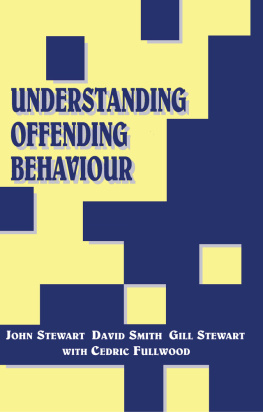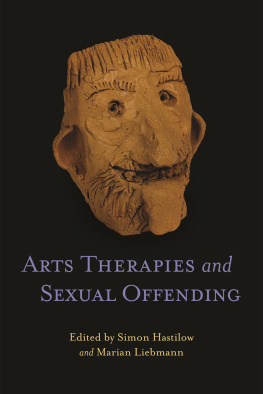Addressing Offending Behaviour
Addressing Offending Behaviour
Context, practice and values
Edited by
Simon Green, Elizabeth Lancaster
and Simon Feasey
First published by Willan Publishing 2008
This edition published by Routledge 2012
2 Park Square, Milton Park, Abingdon, Oxon OX14 4RN
711 Third Avenue, New York, NY 10017 (8th Floor)
Routledge is an imprint of the Taylor & Francis Group, an informa business
The editors and contributors 2008
All rights reserved; no part of this publication may be reproduced, stored in a retrieval system, or transmitted in any form or by any means, electronic, mechanical, photocopying, recording or otherwise without the prior written permission of the Publishers or a licence permitting copying in the UK issued by the Copyright Licensing Agency Ltd, Saffron House, 610 Kirby Street, London EC1N 8TS.
First published 2008
ISBN 978-1-84392-243-8 paperback
978-1-84392-244-5 hardback
British Library Cataloguing-in-Publication Data
A catalogue record for this book is available from the British Library.
Project managed by Deer Park Productions, Tavistock, Devon
Typeset by GCS, Leighton Buzzard, Bedfordshire
Contents
by Simon Green, Elizabeth Lancaster and Simon Feasey
Martin Wasik
Mike Nash
Anthony Goodman
Yvonne Jewkes
Chris Tallant, Mark Sambrook and Simon Green
Pauline Ashworth
Louise Sturgeon-Adams
Iolo Madoc-Jones
Trish McCulloch and Fergus McNeill
Dave Phillips
Amanda Loumansky, Anthony Goodman and Simon Feasey
Anna Souhami
Mike Nash
Julian Buchanan
Simon Feasey
Paul Senior
Brian Williams and Hannah Goodman Chong
Rob Canton
Mark Rivett and Alyson Rees
Elizabeth Lancaster
Clare Beckett
Bankole Cole
Simon Green
Simon Green, Elizabeth Lancaster and Simon Feasey
Acknowledgements
The production of this book has been lengthy and sometimes difficult. This is the first time the three of us have attempted to put together an edited collection and with hindsight we probably didn't pick a particularly straightforward project to start with. The fact that it has now reached print is testament to the help, advice and understanding of a wide range of people. We would like to thank a few of them here.
Thanks go to Gerry Johnstone, Yvonne Jewkes and Paul Senior for their helpful commentary on the original book proposal and for their ongoing advice and support. It is also important to note that from the day we contacted Brian Willan with the idea for this text, he, and the rest of his team, have always been approachable, helpful and understanding. Our thanks must also go to Steve Cosgrove and Phil Clare at the Yorkshire and Humberside Probation Consortium who have been resolute in their support for this text and in their oversight of the Diploma in Probation Studies in our region. We would also like to thank all of the contributors to this text. We think this collection has turned out better than we could have ever hoped for and we have been privileged to work with you all.
At Hull thanks must also go to Peter Young for his cleverness and leadership (in that order) and to Helen Johnston for always listening (or pretending to) and always knowing what to say. Thanks also to Louise Sturgeon-Adams, Richard Barnes, Matthew Happold, Mike McCahill, Clive Norris, Anthea Hucklesby, Clive Coleman, Norman Davidson and Keith Bottomley for making Hull (past and present) an unpretentious, intellectually stimulating and most of all friendly place to work and study. At Bradford thanks go to all those involved in teaching on the Diploma in Probation Studies, particularly the teaching team of Pauline Ashworth, Clare Beckett, Jeannie Lumb and Cheryl Shackleton. Adrian James (now of the University of Sheffield) deserves credit for bringing the DipPS to Bradford in the first place and in so doing changing the course of several people's professional lives. At Sheffield Hallam thanks are owed to friends and colleagues within the Criminology and Community Justice Subject Group (too numerous to mention by name!), co-conspirators who have contributed to the delivery of the Diploma in Probation Studies and members of the Hallam Centre for Community Justice.
And last, but by no means least, we would like to thank our families. The list of things for which we need to thank them would go on forever and would still not do them justice. So just thank you.
Simon Green, Elizabeth Lancaster and Simon Feasey
Notes on the contributors
Pauline Ashworth has recently taken up appointment as a teaching fellow in social work at the University of York. She previously taught criminal justice and social work at the University of Bradford, and still tutors in criminal justice for the Open University. She spent many years as a probation service officer and probation officer in court and field teams in a range of settings. She specialises in practice teaching and learning, offering training in communication skills and methods of intervention. A key interest is in the link between theories/methods and practice, and how the former can shape and enhance the latter.
Clare Beckett lectures in Social Policy at the University of Bradford. She is Programme Leader for the BA Honours Community Justice and for the MA Diversity and Social Policy. She is author of Margaret Thatcher (Haus Publishing, 2006) and joint author of Bevan (Haus Publishing, 2005). She has jointly edited Negotiating Boundaries Identities, Sexualities, Diversities (Cambridge Scholars Press, 2007). Her current research interests interrogate the processes of supervision in a diverse world, focusing on probation supervision.
Julian Buchanan is Professor of Criminal and Community Justice at Glyndr University where he established the Social Inclusion Research Unit, and has over 25 years experience in the drugs field as a practitioner, lecturer and researcher. His research interests include problem drug use, drug policy and practice, social exclusion, criminal justice and marginalised people. He has published in a wide range of journals, is on the editorial board of the Open Addiction Journal, Probation Journal and British Journal of Community Justice, and is Specialist Assessor for the International Journal of Drug Policy.
Rob Canton is Professor in Community and Criminal Justice at De Montfort University, Leicester. He worked in the Probation Service for many years in a number of different practice and training roles. His particular research interests include mental disorder and offending, most aspects of probation, the ethics of penal practice and international exchanges of knowledge and practice. He has been extensively involved in recent years in work to help other countries to develop their practices in supervising offenders, especially Ukraine and Russia. He has also contributed to probation development in Turkey and Romania.
















